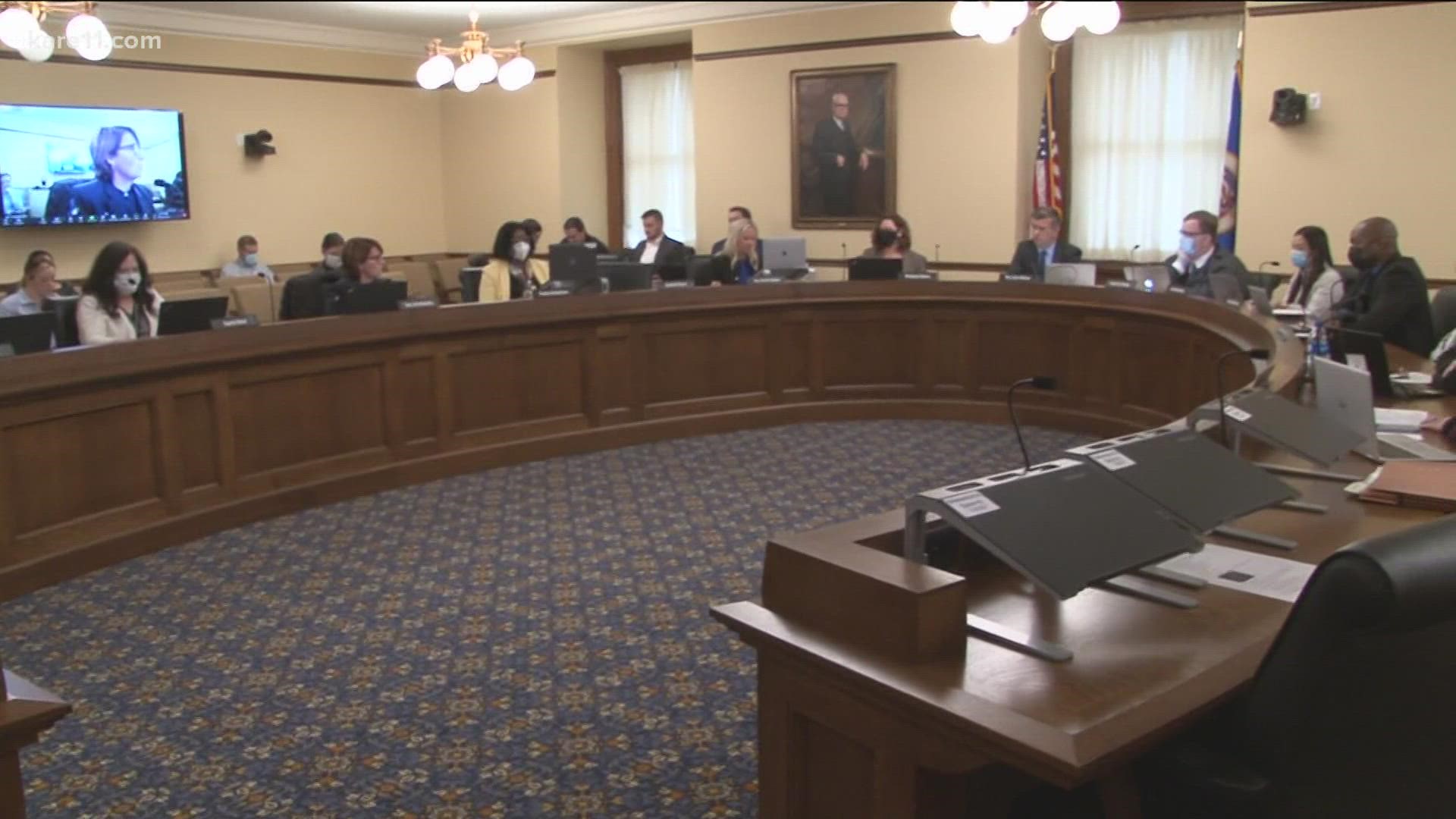ST PAUL, Minn. — The check is not in the mail. It's in limbo inside the politically divided Minnesota State Capitol.
A special working group threw in the towel Wednesday, unable to reach a middle position on which frontline workers should get pandemic pay bonus checks. The panel voted instead to send two competing versions – the GOP plan and the DFL plan – back to the full legislature.
The Minnesota Legislature voted last summer to spend $250 million in federal COVID relief money on special bonuses to frontline workers. The job of deciding which workers would qualify for check, and how large those checks would be fell to the Frontline Worker Pay Work Group, made up of three Democrats, three Republicans, and three Walz Cabinet members.
The group met a dozen times, in hopes of reaching an agreement by Sept. 6, and sending that plan to the full legislature during a special session. But it wasn't simple majority rule. At least seven votes were required to approve any plan, ensuring it would have to have at least some bipartisan support.
That special session hasn't been scheduled yet, and it's unclear if the politically divided legislature will be able to do a better job of solving the puzzles or reaching a compromise than the interim work group did.
"That is very disappointing! That is insulting to those workers, and to the family members of those workers who know their family member went to work, day in and day out," Rep. Cedric Frazier of New Hope, one of the Democrats on the committee, told reporters afterwards.
He noted that many of the categories of workers excluded from the Republican version of the plan are lower pay workers who didn't have sick leave benefits to help them when they caught COVID or had to go into quarantine because of exposure.
The Republican plan would give $1,200 bonus checks to 130,000 frontline workers who were most closely involved in direct care for COVID patients. The Democrat plan would give $375 checks to 667,000 essential workers who couldn't work from home, including grocery store employees, janitors, food service and childcare.
Sen. Mary Kiffmeyer of Big Lake, a Republican member of the work group, said she appreciated all essential workers, but it was never the legislature's intent to include such broad spectrum of job categories in the bonus plan.
"The language was specifically for frontline workers, those who were in direct contact with COVID patients, who put themselves at extreme risk."
Sen. Kiffmeyer also pointed out that the bonus pay legislation gave the panel the option to submit up to three plans to the legislature, so it was clear from the start they might not reach an accord on a single path forward.
In a last-ditch effort, Rep. Ryan Winkler, who chaired the Wednesday meeting, presented a compromise plan that would divide the workers in two groups. Those most closely involved in patient care would receive $612, while other essential workers would get receive $300.
Winkler's compromised failed to get the seven votes needed to move ahead because all three Republicans voted against it. That's when he proposed sending the dueling versions to the full legislature.
"If frontline workers performed like legislators, Minnesotans would be in terrible shape right now in this pandemic," Winkler remarked.
Types of workers that would qualify for bonuses in GOP plan:
- Long-term care, including hospice and home care
- Direct patient care, including phlebotomy and respiratory therapy, and excluding physicians other than residents
- Outpatient health care and pharmacies
- Emergency responders and corrections
- Home delivered meals, such as Meals on Wheels
Additional types workers who would qualify in the DFL plan:
- Public health, social services and regulatory
- Courts
- Child Care
- Schools
- Food service, including production, processing, preparations, sale and delivery
- Retail, including sales, fulfillment, distribution and delivery
- Shelters and hotels
- Building services, such as maintenance, janitorial and security
- Transit
- Airport and transportation services
- Manufacturing
- Vocational rehabilitation
The next regular session is in February. A special session is still possible, but essential worker pay isn't the only issue still in limbo.
Gov. Tim Walz also wants lawmakers to consider a drought assistance program. Senate Republicans have also indicated they'd like him to agree to further restrictions to his peacetime emergency powers.
Senate Republicans are also considering using a special session to fire another Walz cabinet member, most likely Health Commissioner Jan Malcolm. The governor is the only one with the authority to call a special session, but once it starts he has no control over how long it will last or what lawmakers do.

